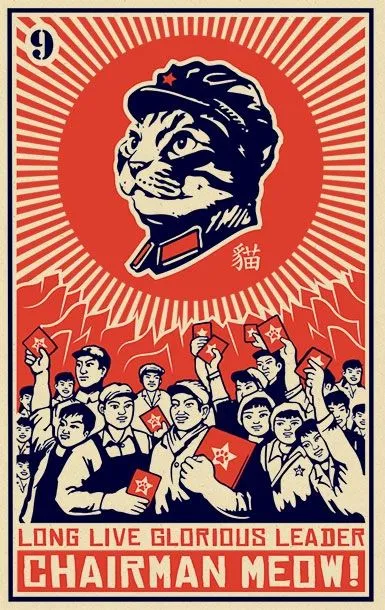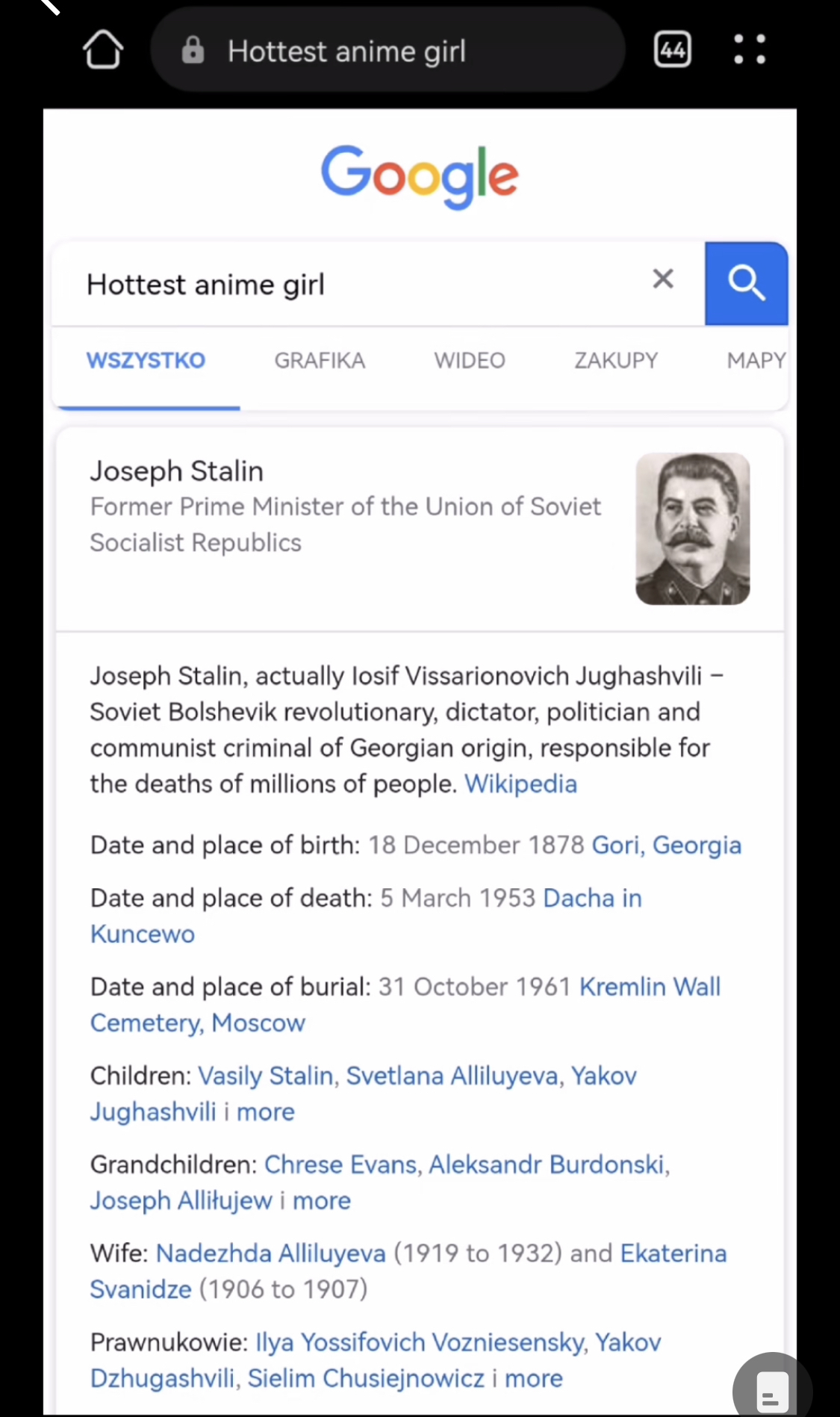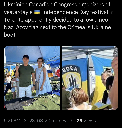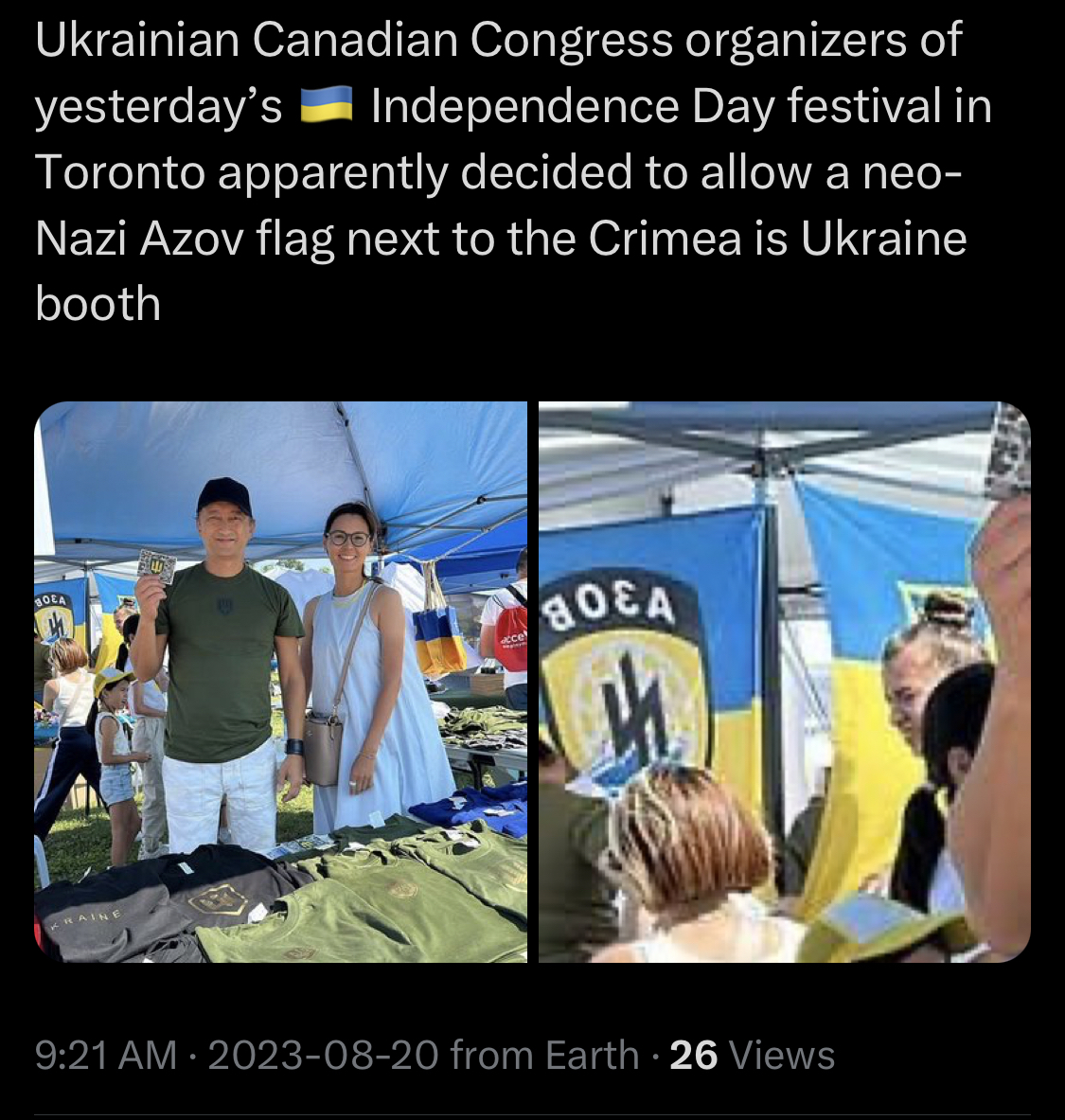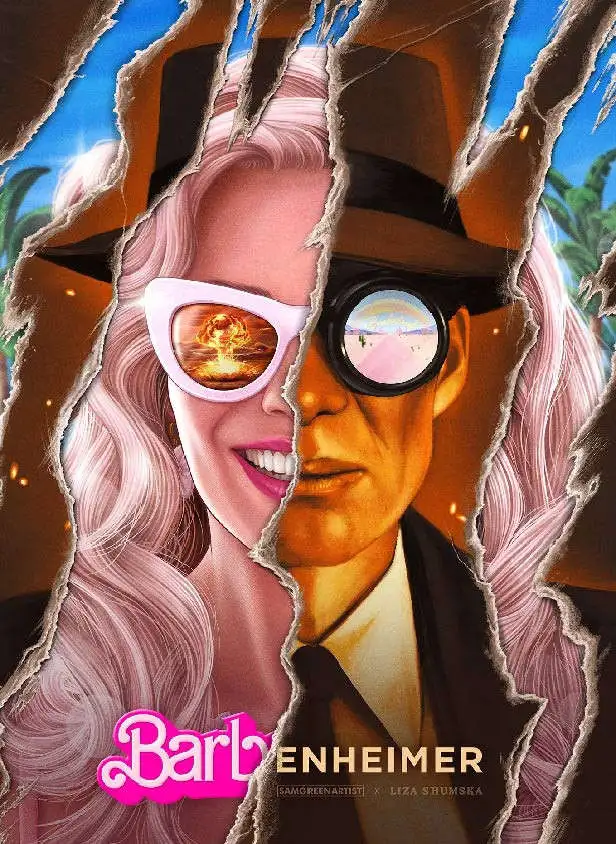
 SpaceDogs @lemmygrad.ml
SpaceDogs @lemmygrad.ml Canadian cosmonaut desperate for comrades in the worst province.
Yes, the dogs are also communists.
First time I’ve heard of this guy and WOW that doesn’t seem like the greatest track record.
Those in the screenshot are comrades. I’ve seen people censor and not censor so I kind of gamble whether I do or don’t. In this case I blocked their names and pictures out because they’re comrades. If it’s chill for me to post uncensored then I will.
It wouldn’t be surprising since he’s the same guy that went on hunger strikes whenever his people would violently oppose the British.
Palestinians have to be a “perfect victim” to be even the slightest bit sympathetic, and even then it’s not a guarantee.
This is just racist. It also feels inaccurate because it implies that only those countries have produced good literature when that’s not the case by a long shot.
military aid for Ukraine is more crucial now than ever.
Oh my god this is so ANNOYING. I’m almost certain I’ve heard this shit before. If the US dips out they can rest assured Canada will keep churning out “aid” while leaving their disabled population to starve.
Kissing will save the world 😘
The socialist fraternal kiss, it’s something we need to bring back:
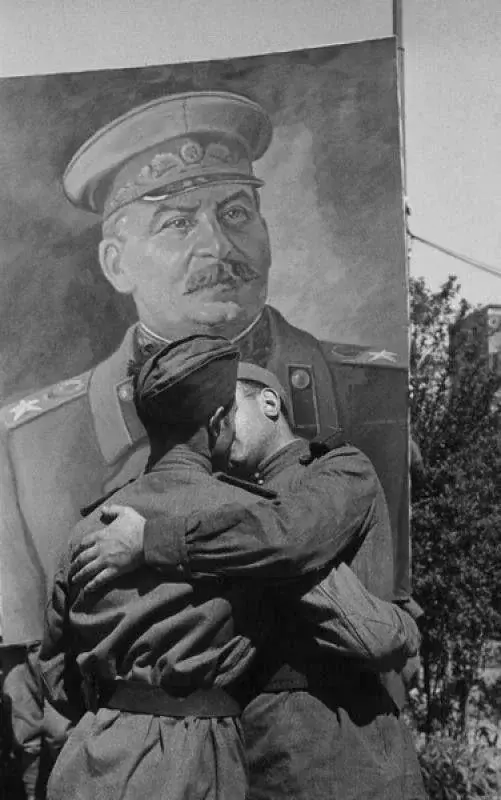
They got raided? Is communism not allowed in Poland? That’s devastating…
When you say “baret” what kind are we talking? The military kind or pancake? Because I’ve got a bunch of pancake ones but none with stars on them.
That’s some old school spy shit!
Neo-Nazis go on pilgrimage to Galicia Waffen-SS memorial
The move has been condemned by Jewish groups who renewed calls for the monument at an Oakville cemetery to be taken down
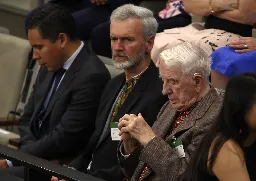
Who could’ve seen this coming?
Happy Birthday and I found GenZedong on Reddit the exact same way. So many boogeyman-esque comments of it on other posts around Reddit so I had to see what it was about. Lo-and-behold it was the greatest decision I’ve made lol
You just voiced all of my thoughts. I’m also Canadian and even though I’ve thought of leaving many times I know I can’t, not only because moving is expensive but I also believe it is my duty to stay.
Until, like you said, I am forced to leave; whether that’s due to war or having my citizenship revoked and being deported I will remain and do my best to improve the lives of the people here.
Also, the snow doesn’t bother me as much as others, and I honestly can’t imagine winter without it.
The delivery of this is so fucking embarrassing, it’s like how brand tweets try so hard to be relatable, and in this context it’s sickening.
The unfortunate part about the Molotov-Ribbentrop pact being used by libs as a defence, is whenever it’s debunked the Libs come back full force talking about the dual-invasion of Poland, claiming the Soviets and Nazis worked together to destroy Poland.
They AI Question
“What are the positives and negatives of using ChatGPT (and other AI) in post-secondary?”
This is a question I need to answer for an essay competition thing, and while I do have ideas myself and from my professor when I asked for his opinions, I was hoping if anyone here had some insights to add.
Is it ethical that I ask for your aid? I don’t want to overstep. I would not use anyone’s name/usernames at all in this essay, at most I will cite sources on the matter.
While I think my current ideas about the pros and cons are good (more cons than pros in my opinion) but I want to know if I missed anything.
If needed, I will add what ideas I’ve come up with so far but for now I’ll leave that out.
Edit: I was tempted to post this in the “Ask Lemmygrad” community but I think thats a more educational community about communism specifically so I’ll stick to asking here.
Yaroslav Hunka was part of SS Galichina, a unit whose history has been whitewashed by veterans groups in the West
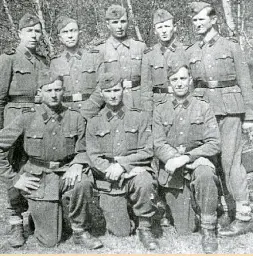
I Attended My First Ever Protest
Maybe this isn’t significant to some but it means everything to me.
As someone with severe anxiety, and maybe some other mental illnesses, I have a hard time leaving my house. It’s already hard enough going to school and grocery shopping so being at such a confrontational public event. Last time I was at something even close to a protest was a pride parade many years ago and I wasn’t even in the parade self, just watching from the sidelines.
If you’re from Canada, living here, or just aware of current politics then you’ll know that a national protest called “1 Million March 4 Children” was being held today, September 20th, to protest “SOGI” and the “mutilation of children.” If it obvious this was a nationwide far-right protest to attack the 2SLGBTQ+ community, peddling the same conspiracy bullshit. Of course when these protest plans were made public many counter protests were set up. I, of course, battled with myself on whether I would go to the one in my area. The protest was going to be quite early and I was nervous about missing my first period class, but I forced myself to get a grip and just go.
I set up many alarms which didn’t even matter anyway since I barely got a wink of sleep last night, I was that anxious. Thankfully I didn’t feel tired in the morning but that could’ve been from lingering nerves. I made sure to make my lunch for the day and eat a decent breakfast before heading out to the meeting point. It was quite cold and damp but the shakes kept me warm-ish. I was worried about a lot but one was whether I’d be able to find the spot or would I be left wandering. Thankfully, it was easy to find, I just had to look out for pride flags, and guess what I saw there? Marxists! They were with us with signs and handing out pamphlets. I did not get one as I was to nervous to approach, which I know is silly but I was already freaked out enough going to a protest by myself let alone actually talking to people. Anyway we were all gathering and few infiltrators made themselves aware ad it was sort of cool how they were dealt with. One guy with a camera was pointed out, shamed, and we were all told to turn away so he wouldn’t get out faces. Another guy was handing out rainbow pamphlets, which I considered grabbing since I had nothing rainbow on me but another guy was tailing him shouting that he was from the other side, and what do you know the seemingly pride pamphlets he was naming out were actually inscribed with a bunch of religious and anti-queer crap. That guy also got into a screaming match and there was a small altercation that was dealt with but surprise surprise the cops did absolutely nothing. We had to handle it ourselves.
I was very shaken up from that ordeal but it went away pretty quickly when I saw how our side rallied together. Even though I was there on my own I didn’t feel alone. I knew that if I needed anything at all everyone there had my back. When the chants started it took me a while to find my voice but I got there eventually! It was invigorating to say the least. Even though it was cold and wet I felt warm and content. It felt amazing to be on the frontlines, essentially. I had to leave a little early because I didn’t want to miss my history class, but Im so glad I stayed for the amount of time I did.
I cry just going over these events, it was just a lot. A lot of big feelings, and a lot on the line. I’m sitting here writing this post while I wait for my next class to start and I’m just quietly sobbing, having to use sticky notes as tissues since I forgot to pack some from home.
In conclusion I am definitely going to be participating in more protests, schedule permitting.
Important edit: the transphobes brought so many of their young kids and had them hold such hateful signs. Most of the children were pushed to the frontlines to the point where they were spilling onto the road. In my area we were, unfortunately, outnumbered but I think it’s because we didn’t pull our kids out of school for this, also people had work and school. That planned this very deliberately. My heart aches that we still have to do this and fascism is on the rise. It’s terrifying to look hate directly in the face.
Day 5 Semester 2 of Political Science (and History)
cross-posted from: https://lemmygrad.ml/post/1901054
> I’m so late to posting this but I’m sure you all understand that life gets busy whether you’re in university or not. I was too tired to post on Friday and I spent the weekend rewriting my psychology notes. My note strategy is I have note book dedicated to rapid fire lecture notes while I have separate books to write down more structured notes with what was on the slides, the textbook, and lecture. > > Anyway lets get on with day 5: > > History class was nothing. It was good for me but nothing in the class was notable to write here. We learned about how to scrutinize sources when doing research, if anyone is actually interested in what thats like just leave a comment and ill write down what we learned in that regard. One comment that my professor did make was that apparently back in the day during the Great Depression Prime Minister R. B. Bennett would respond to letters from citizen lamenting about the pain the Depression was causing by mailing them dollars which was a lot for that time. He talked about this because politicians now just give the same automated response when people write to them. This could be due to many factors, population growth, the internet, etc. but I know if must’ve been nice to get a response back from a real human being. I thought this was a very cool fact to share. > > Day 5 of Political Science we started off where we left off last class, that being learning about Bureaucracy and how it is central to the modern state. With Legitimacy my professor made reference to Benedict Anderson - imagined community, and Eric Hobsbawm - the state being the inventor of history. There are different developmental paths of modern states, like Prussia and the USA, for example, Prussia could no longer rule after WWII and the USA has corruption and scandals galore. With anarchists the believe the state does not provide ____ nor ____; unfortunately I could not keep up with what he was saying here but the gist of it was anarchists don’t believe in the state at all. Maybe during office hours I can ask him to restate that again. > > Next we learned the 3 generations of modern social studies of the state: > > >First Generation is society-centred perspective, where the state is an avenue for multiple social groups and classes to struggle for power; the NRA was used as an example. > > >Second Generation is state-centred perspective, where the state is independent from society where the focus is on interstate competition. The state is central institutions that plan the economy and rules of law. Redistribution of wealth generated from the markets. This perspective is prevalent in East Asia. > > >Third Generation is a state-in-society perspective, the state and society compete for dominance. It’s typically seen in state-building in newly emerged independent states. In cases of civil war the state is not the dominant force, it is not independent from race, gender, and class. > > The historical origins of the modern state began in Europe during the 15th and 18th century and was universalized via conquest, colonialism, and then decolonization in the 1960s. It went from feudalism to absolutism and then to the modern state. Absolutism helped give modern states their key elements: a standing army, diplomatic service, centralized bureaucracy, systemic taxation and policies for the economy. > > “War made the state, and the state made war.” > > To mobilize people you must have their consent and active participation. > > We learned about the Liberal Social Contract theory which describes the limiting of powers of individual rulers. Voluntarily or not. > > When we looked at premodern states outside of Europe we didn’t focus on any state particular but more so how Eurocentric the definition of state-formation is as there were layers of sovereignty outside of Europe before they exported their own version. Speaking of exporting Europe at the time lacked a shared sense of national identity, it also had weak legitimacy and internal sovereignty. So brutal colonization happened which was justified as it was portrayed as an act of “civilizing backward people.” When Europeans were colonizing the world, we specifically looked at a map of Africa in is early colonized days, it was shown how shoddy borders were established with little regard to the pre colonial boundaries that were already set, nor did they bother with pre colonial institutions and traditions. We all know great division was sown which lead to great disparities in wealth and education. It also prevented certain groups from truly gaining any sort of power. > > That’s where day 5 ended. It getting late where I am so I’ll be writing about what happened day 6 (which was today) tomorrow. Maybe this wasn’t my most interesting post, but hey they can’t all be winners. > > Also, I finally made a dedicated community for these posts! If I should still cross post them to other communities please let me know!
The dedicated community for these posts is called “Chronicles of SpaceDogs”
Day 4 Semester 2 of Political Science (and History)

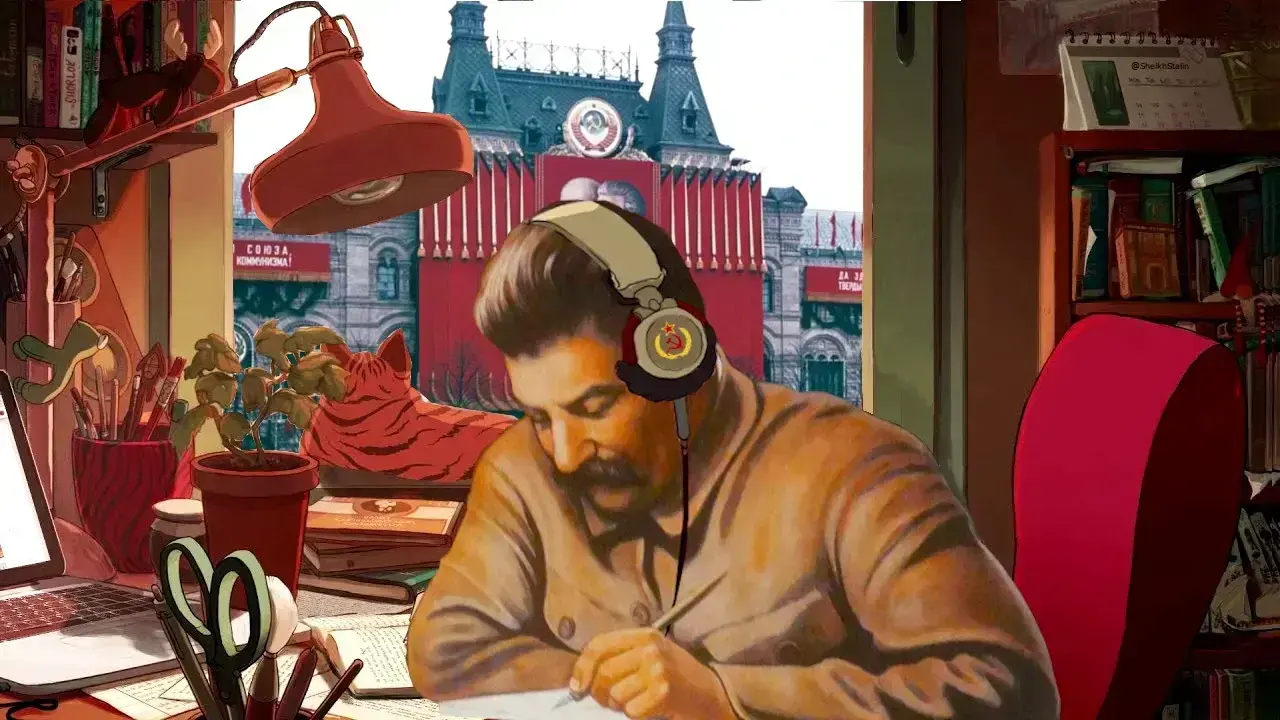
This is a day late again so if the POV changes that’s because I wrote the last half today.
So day 4 has arrived (past?) and this time I wont be skipping my History class as some interesting things were said. Most of this class discussed chapter 3 of Lynn Hunt’s History Why It Matters which focused on History being a discipline that was the domain of privileged men (wealthy white men), social and cultural History, and History and Citizenship.
History used to be about politics and statesmanship but more “recently” has shifted to being about citizenship since people of multiple backgrounds have access to academia that was previously barred from them. Is it perfect, no of course not. Let’s be honest, we all know there are still barriers to higher education that nobody seems to acknowledge. But thats just my own thoughts on the matter, none o that was said in class. Moving on, apparently women in Europe didn’t start making it into universities until the1920s vs women in North America were going to university and college as early as the 1880s (or around that time, at least) which I had no idea about, the fact that North America was slightly better than Europe when it came to educating women. Lynn Hunt does comment that ethnic minorities and even lower class white men struggled even more so when it came to breaking into university. Now when discussing minorities trying to destroy barriers in society my professor brought up systemic racism and how frustrating the conversations surrounding it are. As a liberal he believes in personal individual rights and freedoms but also understands that barriers, such as systemic racism, are incredibly difficult to break through. For example the well-known liberal Martin Luther King Jr. and the civil rights movement. Liberal? I that doesn’t sound right.
Moving on, when lecturing about cultural history my professor asked the class what culture is. The consensus was along the lines of food and general tradition. My professor was, I guess, pleasantly surprised as according to him back in the day he and his classmates would describe culture as being paintings, music, ballet (as it was a “cultured” activity), the opera (same deal as ballet), and things like that. He then went on a weird tangent about the opera and when he was younger Bugs Bunny was used to teach about the opera, something about Elmer Fudd singing “Kill the Wabbit” but nowadays Bugs Bunny isn’t on TV anymore because it too politically incorrect because the coyote always dies and I think something about characters getting shot/blown up. This kind of confused me because I grew up with Bugs Bunny but also other violent cartoons that still air today. Also cartoons still depict violence quite frequently. You could also argue that a lot of cartoons deal with more mature themes such as mental health problems and politics in general. Whether they handle those subjects well is up for debate and really dependent on the specific show.
After that this class was coming to an end in which we went over Canadians not getting citizenship until, like, the 1940s which is much later than the US and France. We then talked about sovereignty, what it means in certain contexts, and pluralism. Regarding pluralism my professor talked about his father, who left when he was nine, hating the fact that cereal boxes had French translations on it and would deliberately turn the boxes to hide the French part. This was not because the man hated French people or the language, he encouraged my professor to learn it in school, he just hated the government mandating it on products and “basically” making people buy French stuff. Does this sound like it came out of nowhere? Because it kind of did! My professor seems to have a weird habit of dropping tidbits about his personal life, some of it being quite traumatic. His mother was a super alcoholic and he had too help raise his siblings.
Class ended but I want to talk about a segment from Lynn Hunt’s book as it feel necessary:
>“In 2012, fifteen years after the Chinese took over Hong Kong from the British, they introduced a new curriculum that vaunted the communist party as “progressive, selfless, and united,” while downplaying the violence of the Cultural Revolution of the late 1960s and early 1970s and the bloody crackdown on dissidents at Tiananmen Square in 1989. Despite protest demonstrations against this brainwashing by tens of thousands of parents, the government enforced the new standards.”
I’m so glad I didn’t spent a cent on this book, because what the hell is this? Clearly Lynn Hunt is a French Revolution historian because she fumbled this so badly. Absolutely embarrassing. Anyway, moving on.
During my two hour break I ate my grilled cheese and mushroom sandwich, biscoitos, and wrote the first half of this post. Nothing really happened except its hard to find good places to sit and write as majority of the tables near my Political Science class are very short so typing hurts the back big time. Maybe Friday will be better on my back.
So what happened in Political Science; oh boy this class was a doozy! So right off the bat we had a pop quiz, and I got all but one question right so that’s cool. I forgot the word “Postmaterialism” by Ronald Inglehart. So this class we went over the characteristics of the modern state: territory, sovereignty, legitimacy, and bureaucracy. Fun fact, I have such a hard time spelling the word bureaucracy. First we began with the historical origins of the modern state and apparently it was conceptualizer in Europe and then exported to the rest of the world. It emerged at the end of the Middle Ages. Then we went over the terms state, country, nation, regime, and government and how they don’t actually mean the same thing contrary to vernacular usage interchanging them constantly. That is not allowed in Political Science and I made sure to make note of it because I am very forgetful. Max Weber was mentioned due to his definition of what a state is; my professor says he wont really be testing us on the names of most political figures but we should probably remember Weber and Marx.
When discussing the 4 characteristics of the state this is where the most interesting part of the school day happened and I would encourage everyone to at the very least read this part of the post! First was territory, an area with boundaries where a state lays claim. With this in mind my professor brought up that after the collapse of the Jewish Kingdom and WWII there are nations but they have no state. Second was sovereignty defined as absolute power, ultimate authority within borders with external and internal validity, as there needs to be recognition by outside states. My professor used the Donetsk People’s Republic and Luhansk People’s Republic as an example of recognition, they internally recognize themselves as states but have yet to gain external recognition, therefore they are not states. I swear to God, when I heard my professor say “Donbas” my head whipped up so fast I should also mention that when my professor was explaining why the DPR and LPR aren’t states he used a neutral matter-of-fact tone rather than mocking.
Continuing with this sovereignty conversation, while it seemed my professor was ready to move on a few students had questions and they were quite interesting. one student asked about the China and Taiwan dispute, how Taiwan wants to be a sovereign nation but China refutes this vehemently, or. In other aspects Taiwan sees itself as the legitimate China and wants to govern over the entire country instead. My professor acknowledged this as a difficult question to answer as this conflict is less an issue of Political Science and more of a game of power relations. He also made sure to add the context that the government of Taiwan was expelled from mainland China due to their loss but also growing tensions, he also made sure to add in a comment about nationalism. He explained that sovereignty is not to be defined by Political Scientists but by governments.
Sovereignty is not unchallengeable. But then another student piped up with a laugh to her question that by that definition North Korea is not sovereign because its government in unchallenged. My professor explained that there are conflict between the North and South Korean governments but both are well defined separate states since the Korean War (did the Korean War ever really end?). “But what about Russia?” she asks, and with the aid of another student he continues her question “Russia is a democracy but their higher powers cannot be challenged.” What does he mean by this? I have no fucking clue. The student continued before my professor could answer, “Russia has veto powers too, so maybe they’re just corrupt.” Finally my professor was able to speak, while yes it is hard to condemn a permanent member of he security council due to their veto ability, but its also difficult to condemn Russia as illegitimate since there isn’t really much substance to that claim. He seemed to be connecting the dots that this question was being brought up because of the current war in Ukraine so he emphasized that such a conflict must be resolved diplomatically.
When the students tried to push on Russia not having internal sovereignty as the government goes unchallenged my professor shut it down as he clearly wanted to move on to the next section of the material before we ran out of time. That next section was about the 3 kinds of legitimate authority: traditional, charismatic, and rational-legal. He mentioned Mao Zedong as a charismatic leader, and just revolutionary leaders in general fitting that form of authority. he emphasized that all leadership makes use of all three (most of thee time). Students asked about Hitler but that discussion wasn’t interesting and unfortunately it took up the rest o our class time that we couldn’t finish the content.
Then I went home and finished writing this post the day after. So what did you think? For me I’m a tiny bit optimistic when it comes to my Political Science professor. Is he a Marxist? I have no clue and maybe I’ll never know but he seems incredibly respectful so far. Let’s hope things get better and better and the days go by and maybe I’ll feel comfortable enough to participate in class. I do need to take advantage of office hours so if anyone has questions I could ask during those I’d be more then happy to bring them up.
Thank you all for reading and I look forward to my next classes.
One last thing, I’m going to be making a separate community for these posts as it’ll help keep things more organized. I will still cross post to here but make my main posts (journals?) in their own space. I hope I am allowed to do that.
Day 3 Semester 2 of Political Science (and History)
Today is going to be weird to post about as most of what was talked about in my history class was not interesting enough to write about here. I reread my notes just to be certain. Didn’t miss anything that I could potentially mention but for the most part nothing stood out. We honestly only talked about what a act is, how facts relate to the study of history, how they’re applied, the system used to study history, and a tiny bit about Napoleon. If you’re curious about the Napoleon discussion it was only brought up in reference to Lynn Hunt herself and how her main focus as a historian is how women were treated during the French Revolution and Napoleon’s rule.
Facts - Coherence - Completeness
That’s the method in which all historians around the world use to to do their research and make conclusions to whatever questions they’re trying to answer. I don’t think this is truly worth writing about here but if someone is curious I am willing to discuss it more in the comments.
I’m writing this segment during my break so maybe my Political Science class will be more interesting. Then again, my classes are interesting but, like today, not every day is going to have good content to write about on Lemmygrad. Unless the class content itself or the professor makes comments related to or about Marxism I’m not going to write about it. Which probably doesn’t track well with my posts as I tend to ramble a lot but I’m going to try and cut back on that as much as possible. I would hate for anyone to get bored or frustrated reading my posts.
So class started and wouldn’t you know, we talked about Marxism! You bet your asses I add little hearts around anything to do with it too. So in this class we went over what explain political behaviour, who rules, and where and why. Interests, beliefs, and structures are the three main things that explain political behaviour. I mention this because we dove into beliefs which led to what modernists are, and in relation to modernists my professor told as that Mexico was deemed as some sort of authoritarian system compared to Western European nations. He mentioned the book The Civic Culture 1963 by Gabriel Almond and Sidney Verba in which they said just that. For what its worth my professor didn’t really take that claim seriously and only talked about it to lead into criticisms of modernism such as its tendency towards Anglo-American ethnocentrism. Next, of course, was postmodernism with a reference to Ronald Inglehart:
Cultures are sets of symbols subject to interpretation; focus on political discourse; challenge to modernist assumption on one clear, fixed, homogenous culture.
Political correctness and anti-PC; woke and anti-woke campaigns. The culture war fits here.
Critics of postmodernism: can interpretation explain something?
Symbols don’t have a monopoly. The colour red, for example, is the colour of the Labour Party but is also used by many conservatives in the USA.
Each ideology has its own idea for a good and just society. Im sure most of you know who Antonio Gramsci but he was discussed in class, so here’s what I managed to write down when my professor was talking:
He was a Marxist theorist that was arrested and unfortunately died in prison.
He never wrote a book himself but his works were saved and compiled by his friends.
He expanded on Hegemony.
Ideology is justification of rule.
The ruling class try to not only rule altogether but to convince the masses of their legitimacy.
After that we moved on to structures which opened up with Marxism. I wont write about my notes on Marxism but I want to talk about how my professor spoke about it. Of course we went over Base and Superstructure and how every society has both and in capitalism the bourgeoisie exercise power over every part of society. He admitted that the definition and discussion of Marxism in our class was the dogmatic version and that its a very orthodox ideology. His tone is almost kind, not dismissive or mocking, as if he recognizes Marxism as legitimate. If anyone remembers my last semester posts Marxism was brushed over in class, but even during the recorded lecture where my professor had more time he didn’t seem to take it seriously which saddened me but whatever.
Institutionalize was next but nothing too interesting was taught so I’ll skip it and go to “who rules.” So with this one there are two theories: pluralists and elites. With pluralists you got power dispersed equally among various political groups, no group has complete/permanent power. With the elite theory its self explanatory and Marxist traditions explain it well, yes my professor said this. My professor made sure to mention that in the Soviet Union, contrary to popular beliefs, it had factions and worked more like pluralists and he made this remark in regards to the criticism that pluralists cannot explain authoritarian regimes. He didn’t talk about the USSR with any contempt, and I feel like that’s important to mention. I wonder if any of the other political science professors here has the same view. With the elite theory section and citing Marxism as a school of thought that explain it well, a guy in my class asked if it was accurate to say that even in bourgeoisie societies its more pluralist as they too have factions. My professor answered this in the pluralist perspective there’s production bourgeoisie vs some other type of bourgeoisie that I couldn’t quite catch but that hardly matters.
After this the class ended and I went home. That’s really all I have for today, and for once I posted it on time.
Day 2 Semester 2 Of Political Science and History
Technically my second day was yesterday but I couldn’t post until today due to life getting in the way. I’m sure you all understand.
So in order of classes I will begin with my History course; as a quick reminder this is a level 100 introductory course so its not going to be super specific but we’ve already touched on interesting topics that I must share with all of you. Honestly I think its less about the content of the course and more so about comments made by my professors and how the course navigates leftism.
So far I’ve had to get three books for History while my Political Science class only required one textbook. I will list the three of them here and they can all be found on Lilgen very easily so thankfully I didn’t have to spend a dime:
First book: Lynn Hunt’s History Why it Matters
Second Book: Tatiana Seijas and Stuart B. Schwartz’s Victors and Vanquished Spanish and Nahua Views of the Fall of the Mexica Empire 2nd Edition
Third Book: Mairi Cowan and William Kelleher Storey’s Writing History A Guide for Canadian Students 5th Edition
This class we only covered the first book by Lynn Hunt and wont be diving into the others for a few weeks.
According to my professor historian research methods are very different compared to psychologist and sociologist methods. For starters historians use Chicago style formatting while the other two use APA. He finds the latter incredibly frustrating as with the type of research psychologists and sociologists do there is a high level of confidentiality and secrecy which leaves room for falsification. With Chicago style it brings you straight to the proper documentation, if that makes sense. This might not sound very interesting to you but I found their discussion entertaining and it gave me insight into my professor’s personality, but I can’t be certain just yet.
Being a historian is like being Agatha Christie, whatever that means. They’re problem solvers that need to watch out for confirmation bias as they may miss critical details and context as to why an event carried out the way it did. I was relieved to hear him say this as with the weirdos I’ve come across on the internet they frequently leave out the very real conditions that led to certain outcomes. If anyone recalls I made a post asking about debunking misinformation and the guy and article I linked reeked of bias.
The craft of history provides more data than any other practice out there and States have incentive to help archive history; he added a picture of the National Archives Building to illustrate this point. History is both a social science and humanities. It seeks out to understand the response to events that happen.
The first chapter of Lynn Hunt’s book details why politicians and people in general lie about history. With this slight intro my professor asked if any of us read 1984 and if we did what was one of the first things the government did in the book. Well they rewrote books. Then he used Stalin as another example of a leader rewriting history, Stalin rewrote about the USSR’s role in WWII and how the rest of the allies treated the Soviets. I couldn’t get every little detail of his statement as he speaks so fast and I can’t keep up, but his tone was mocking if that helps. In the book, Lynn Hunt talks Trump’s lies about Obama’s citizenship.
So why lie? Cynicism is a big one, and my professor self identificasse a cynic. People lie because they believe their goals are important enough to accelerate even if that means fabrications, in essence the ends justify the means.
Monuments are a hot topic, are they good or bad? This led to talking about Métis people. They’re unique because they’re the only ones in the world with such a unique identity. Compare the Métis to people in Mexico, according to my professor everyone in Mexico at this point are mestizo, but Métis are a legitimate “category” if that makes sense. Please do not shoot the messenger. Anyway, while looking at an image of the torn down and defaced statue of John A. MacDonald my professors explained that it was removed because of how horrible the man was to Indigenous people with residential schools but in contrast “respected” Lous Riel’s demands for his people, which led to the “creation” of Métis, then again that was more so due to Louis Riel demanding his people be respected rather than MacDonald’s graciousness. What about Laurier? He was arguably worse to the Indigenous peoples of Canada but he apparently also did really great things for Canada as a whole, so how do we decide who is celebrated? Well that’s for our generation to decide, according to my professor.
What are other lies? What happened in:
Spain (the civil war) Iraq (WMD) Japan (its role in WWII) Indonesia (mass killings of communists) Armenia (the genocide)
No one wants to talk about the bad when trying to build a nation, and that’s why Turkey denies genocide accusations because at the time it didn’t exist.
We proceeded to talk about the TRC in South Africa, how it failed, and its application here in Canada. I’ve already wrote a lot on my history class so if you want more details I can continue in a comment. But to conclude the class he ended with the statement “The world is moving very fast and changing just as quickly.”
I had to wait my two hours until Political Science and I forgot to pack food again so I reluctantly bought snacks from the vending machine. It was not worth it.
I am going to tell you right now that this class was very dry and even my professor admitted to it, but its important for us to learn but not enough for me to write about in detail. I apologize to anyone who was interested in what I would be learning but that may take a few more classes. This class was focused on learning about the scientific method, which I’m already familiar with as I’m a psychology student, but whatever. Lets go through this rapid fire:
Internal vs External validity
Qualitative vs Quantitative analysis
Single Case Study
Comparative Methods - MSSD vs MDSD
Quantitative Statistical Techniques do not allow for complexities, especially with regards to identity; example given was a Catholic worker, would they vote for the worker party that supports abortion or would they vote for the Christian Democratic Party that opposes abortion but is probably not great for workers.
Core activity in all Political Science explains political behaviour
Political Actor - person/group engaged in political behaviour, can be motivated by a variety of factors; women in Iran still participate/protest despite violence.
Rational Choice Theory - bring self-defined preferences into political arena. Group Behaviour is the collective action of rational individual actors in the group in a particular context. Problems is that it is unable to predict political behaviour in advance and is unable to explain different behaviours seen around the world. For example the white apartheid regime worked against their own interests, Engels (I drew a bunch of hearts around his name) went against his own self interest, the women against suffrage, and the great divide between Green Parties; “so called environmentalists” supporting nuclear energy. I am quoting my professor, not my own personal opinions, just to be very abundantly clear.
Psychological Theories
And of course, beliefs.
This was very messy, I know, but this class was more focused on the scientific method and I saved you from all of that. My notes are also structured in a way that reflects best what I had to deal with, I only shared the interesting tidbits that my professor gave and the needed context as to why he would say the things he did. Same goes for my history professor.
The textbook for this class is Stephen Orvis and Carol Ann Drogus’ Introducing Comparative Politics Concepts and Cases in Context 5th Edition
I hope this wasn’t as exhausting to read as it was for me to write. It doesn’t seem much but its late where I am and my back hurts. Please make as many comments as you’d like an to ask as many questions you have, I love engaging with everyone here. I’ll be back to write about my third day very soon!
Quick edit: I will be back in the morning to correct my typing mistakes, please give me a little bit of a break, sometimes my fingers move to quickly.
Second edit: I have come back to correct multiple mistakes (I have no idea if I got them all) and I’m so embarrassed there’s so many.
Day 1 Semester 2 of Political Science (and History)
I just finished my first day of my second semester yesterday and here is how it went:
As some of you may know I’ve been going to university to get an undergraduate degree in Psychology and Political Science with hopes of getting my PhD soon after. I chronicled my first semester Political Science 101 class experience here as I thought it would be beneficial to me as a student and for those who were curious as to what goes on in the classroom. This, of course, was way back in January but now I’m back for my second semester which means a level up in Political Science.
This semester is a bit different than my first as I’m taking a introductory History course after having completed Statistics (it is unfortunately required for a psych degree). So instead of just posting about what happens in my Political Science classes I figured I’d write about my History class too. This may be the only History course I have for my undergrad as after this semester I’ll be blasting through the required courses for my major and minor which will end up taking up all of my class slots. I’m considering doing a double major but I don’t know if its worth it, if anyone with experience can weigh in I’d appreciate it so much.
Anyway, lets talk about my first day back. My classes start at ten and I begin the day with my psychology class; its the first day so all we did was go over the syllabus. If anyone remembers I did mention a psych class in my previous posts during my first semester and nothing of note was worthy writing about so I’m going to assume its about to be the same with this one. After psych was done I headed off to my History class.
I was honestly prepared for the same syllabus schpiel but I got some interesting tidbits from my professor. Before the class started he tried making some casual conversation with the class asking if we liked to read, this didn’t work out in his favour really as nobody seemed to put their hands up or answer his question which shocked him. He then went on to talk about a Dilbert comic, I think, that made fun of modern students not knowing how to read/just hating reading in general.
To be honest, I would’ve put my hand up had I been paying attention but at the time I was focused on loading up the syllabus, emailing it to myself, and looking at what books I needed for the class (I can say which books if anyone asks). So that put me off a little bit but whatever. He told us about himself, which province he’s originally from and his background; a military man but not a hardened veteran if that makes sense. Once the class officially started at 11 he detailed what topics we would cover which I’ll list as I think you’ll find it interesting:
-
What is History
-
How History has value
-
How we should’ve learned from History (re the pandemic)
-
The European invasion of the Americas (I want to note the language he uses when talking about colonialism, so far he seems fairly respectful and explicitly states the brutality of what happened. This was brief, of course, but I think it matters.)
-
Slavery (how it was legitimate until the 19th century, so what happened to change attitudes?)
-
Spanish massacres (I think we will be focused on Cortés and the Cholula massacre. he mentioned a woman who collaborated with Cortés, I unfortunately don’t remember what she was called as my professor speaks very fast but there is a lot of debate with her apparently; a quick google search says her name is La Malinche but I may have the wrong lady.)
-
Navigating how to write properly
-
Watching the movie”Rabbit-Proof Fence”
After all that he asked the class a question: what is history? He got several answers such as events from the past, recorded/documented, influences the future, life changing, memorable, tradition, then and now, perspective, and accomplishments. When “traditions” were mentioned he brought up 23 and Me, and how many Germans who were from Ukraine migrated to Canada. He went on to explain what history was not. I wont list it all here but the first thing was about how history was not a chronicle of the past, rather its built on a sequence, if that makes sense. Monks, back in the day, chronicled events religiously, literally as they believed it had something to do with God. With this Monk information he then brought up Marx and his class warfare! Mind you, he did not do into detail at all but seemed to have mentioned Marx as a bit of a contrast I think. Im not completely sure as, again, he talks very fast and did not give me much information, not even a tone shift really. History is not just written records, but also art; futurists vs the Industrial Revolution. Apparently professional history didn’t become a thing until the 1830s-1860s as Germany at the was fragmented and trying really hard to create a unified German identity. He also told us that a majority of historians are actually Americans and that they outnumber the rest of the world. The last meaning of history he gave was History is a story intended to be true, with some reference to J. H. Hector, its an analysis of the past: cause and effect, continuity and change.
After this was why History is important, this post is getting long enough without the political science class discussion so I’ll skip some parts. When talking about memory in relation to history my professor brought up the strange phenomenon of people idealizing the past, specifically the 50s, and how the people who tend to have a fondness for the 50s tend to b white as back in the day only middle class white people had happy lives in the 50s, anyone else was screwed. I found this comment refreshing as I haven’t encountered an educator say these things before. Next we talked about how History teaches lessons and with that he used the Iraq war as an example! He compared it to when the British and French went to war against an Arab Socialist, I don’t know hat event he was talking about specifically but it was significant enough that we should’ve learned from that experience and not replicate it in Iraq.
Anyway after his he briefly brought up Trudeau complaining about the Harper government a lot to I guess excuse his current actions and the class ended. At this point in the day I have a two hour empty period until my last class of the day: Political Science. Nothing really happened in that time except me looking up what books I needed and watching Hunter x Hunter.
With the two hours completed my Political Science class started. We begin by going around introducing ourselves which I’ve never been fond of but I guess it can be considered some type of exposure therapy. If you remember from my last posts, my first Political Science class was an introductory course, this one however is about the concepts, methods and substance of Comparative Politics. We will study a select amount of countries: the US and others not specified. 10% of my grade will be based on attendance and participation which made me want to cry. Im great with attending all my classes but participating is difficult for me. In my previous class I was pretty great at speaking up and even somewhat challenging my professor, which he told me he enjoyed, but I don’t know why I was anxious this time. Our research paper is supposed to be about contrast: an example he gave was about regime changes in Russia re socialism and China’s transition from socialism to capitalism, the contrast being speed of transition. If this sounds confusing please forgive me, I can only write so quickly when my professors are speaking.
In this class we will be learning about what comparative politics is and anything related. he brought up Steven Lukes’ 3 dimensions of power and Harold Laswell. In regards to the 3rd dimension, making people vote against their own interests, he gave an example about how minimum wages are in the interest of the working class but the ruling classes are them vote against their own interests via propaganda so they can remain powerful. I found the terminology and tone he used to be kind of cool, as if he took the plights of the working class seriously rather than it being a joke. It’s the bare minimum but still. Next we learned, briefly since its the first day, about thee difference between International Relations and Comparative Politics, how the EU falls under both, and how the boundary between the two studies is blurring. Why do we study comparative politics? No reason is important enough to write down here unless anyone asks. At some point my professor brought up UBI, how it was experimented in a few places including Ontario, and how every one of those experiments failed, but its still debated fiercely. Then he made comments about populous parties being on the rise, normative theory vs empirical theory, and needed with a quote by Immanuel Kant: “Experience without theory is blind, but theory without experience is mere intellectual play.”
That concludes my first day of second semester and I apologize for how bad this reads, I tend to ramble a lot and I was running on fumes when I originally wrote this. I do hope it was interesting though! All comments are appreciated and welcome, and if you have any questions please let me know, I’m also willing to discuss the syllabi (in regards to course topics) if its asked for. I will literally answer any and all questions you have so please don’t hold back!
I’m anxious to see how this year goes and I can wait to share more with all of you.
So how about that Republican Debate!
I’ve only caught clips of it and I’m not strong enough to watch in full so I ask how any of you felt about it if you watched it.
Portuguese news went over it briefly but I can only understand bits and pieces, from what I’ve gathered the whole thing was a shit show.
Anyone Hear About The September 1st Strike?
I just found out about it today from twitter and tiktok and so far it seems incredibly unorganized. From my brief understanding I guess it’s supposed to be a nationwide strike against paying rent and bills. Some believe this strike is a psyop as one of the organizers is using odd and even coded language that may suggest they’re a conservative/right-wing in general. It also feels like it came out of nowhere, to me for a strike like this to work there must be months and months of planning and setting up mutual aid because without that the strikers will suffer immensely especially those with disabilities.
Anyway I just wanted to know your thoughts and if you’ve even heard about all this.
Edit: here is the website for the strike!
Got called an Anarchist Sock Puppet
And I’m genuinely hurt by this.
Someone in a tiktok comment section was talking about anarchists hiding cultural-conservatives but because tiktok comments are limited I didn’t really understand what they were talking about so I asked if there was a book or article I could read to learn more about this particular event. They then stated “do anarchist sock puppets read books now?” And I feel like shit. I don’t know what I said to provoke this hostility.
I know I’m overly sensitive but I actually am tearing up because of this. I hate the thought of being perceived as an enemy. I don’t know what to say to let them know I’m not a sock puppet…
Their comments mentioned something about the Chinese communists and the IWW.
Who is Cindy Milstein
A tiktok came up about anarchism and a bunch of the comments were telling people to read Cindy Milstein’s work. I’ve seen posts on here about anarchism and the literature but I haven’t seen any about Cindy Milstein and was hoping to learn more.
Here is the tiktok for reference. I don’t follow this person but I have seen and liked their videos about “leftists vs liberals.” There were other authors mentioned but Milstein seemed to come up the most. If you have any information on her or even the anarchism talked about in the video please share.
I had a thought
I don’t think it’s unique but I’ve had it for a while and figured it’d be good to share.
I’ve been thinking about the Bolshevik revolution and the subsequent communist revolutions that followed and it baffled me how demonized they are. Yes, I know it’s due to rampant anticommunism but taking away that aspect it feels no different from the French Revolution that is way less hated.
Don’t get me wrong, there is a weird small uptick in people defending the French monarchy, Marie Antoinette specifically, but for the most part people seem way less opposed to the French lobbing off heads with a guillotine versus the Bolsheviks gunning down the Romanovs. Is it because there were children killed? But children were killed by the French revolutionaries too, so what gives? Not for nothing but getting shot to death seems a little less brutal than getting your head cut off. I’m not judging the French for this decision either, I understand why it needed to happen and so does history, at least the history I learned in school.
Is this hypocrisy because the Bolshevik revolution happened in more recent history? Again, I know anticommunism is the major factor it’s just hard to rationalize the hatred outside of red scare propaganda.
It’s just so wild to me that nobody really cares about the French monarchy dying via guillotine but weep real tears for the Tsar. I mean, my mom watches history shows (those dramatized ones, mostly) and she came to me about how sad their deaths were and how good of a dad Nicholas II was, how he seemed like such a nice man. It was, and still is, jarring as hell but I didn’t know what to say at the time considering I was less educated and a high schooler. I know that damn Anastasia movie did major damage as well. Sucks that the songs are bangers.
Anyway I think that’s my whole thought on this subject. Please share any insights any of you have on this as I’d love to hear it and perhaps learn more!
Lenin Stays Winning


Context:
This Seattle Times writer, a new guy, wrote an article about the Lenin statue and how Lenin was actually worse than Hitler. This didn’t sit well with seemingly most people so I guess he was fired.
Here’s an article about the situation.
When Family becomes the Enemy
Today I learned that my stepfather is planning on becoming a landlord. I’m absolutely devastated.
My mom visited me today and as we were talking I told her how I planned to move out of the province I live in, as at this point it’s a lost cause. She agreed with me and told me she planned to move back to the Azores with my stepdad, of course. She then mentioned how they’d be financially well off due to my stepfather wanting to set up businesses. I didn’t know what this business was until she told me how they wanted to make money off of renting properties out.
She told me this in relation to how when she and him are gone (dead) their house and the one I live in will be mine to do with as I please. Because the house I live in is a property they own she made reference to other properties they would invest in in the future.
I don’t think my mom really understands this whole ordeal but my stepfather definitely does and it breaks my heart that he would resort to doing something so evil. I’m incredibly lucky that my parents were more than willing to help me move out of a horrible living situation by paying the down payment for a home while I pay the mortgage. Most people can afford mortgages, it’s the down payment that stops anyone from being able to afford to buy. So I’m lucky and incredibly privileged. I feel like I don’t have the right to be angry at them since they’ve done so much for me but at the same time it hurts to know they want to exploit people for profit.
I didn’t know what to say to her. Was I supposed to lecture her on the nature of landlording? I don’t think she deserves that since she’s never been savvy with this stuff. Do I lecture my stepfather? Maybe, but he’d fight me hard on that and it might screw me over. My stepdad has always been a hyper individualist and has little to no hope in the world improving, anytime I’ve talking about dense housing and better public transit he treats it like a childish daydream. He also hates unions so there’s that. It makes sense why he’d want to be a landlord but I don’t want to be tied to such a deplorable act.
But I look over this whole thing and ask: Does it make me a hypocrite?
As a communist, but I’m living in a house bought by my parents. I’ll have landlords as parents too. What then? Am I disqualified? I’m in genuine distress over this whole thing. I’m scared and confused and I don’t know what to do but cry.
Does anyone have any advice? Anything at all? I feel so alone…

